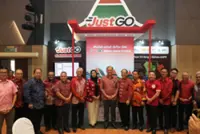KUALA LUMPUR: Malaysia has significant potential to become a regional hub for electric vehicle (EV) manufacturing in ASEAN, thanks to its 40-year history in automotive production since 1983 and its strong semiconductor cluster, said Deputy Minister of Investment, Trade and Industry Liew Chin Tong.
He said the country aims to foster greater integration between the automotive and semiconductor industries, with the goal of becoming a leading hub for designing chips specifically for the automotive sector.





